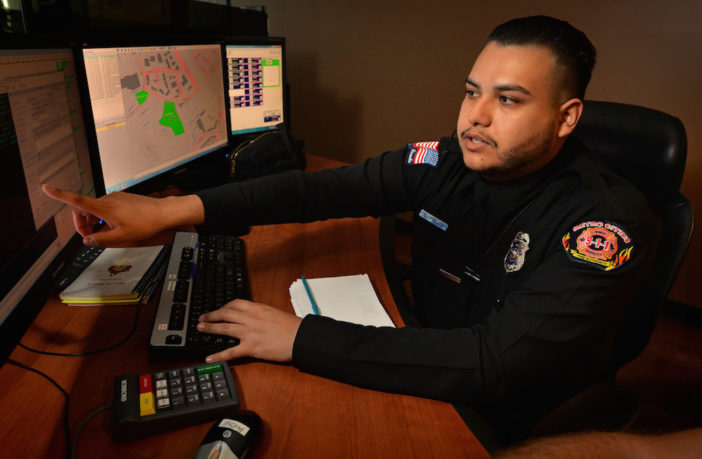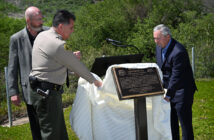Headset on, Metro Net dispatcher Steven Perez calmly greets each caller on the other end with the same question:
“Fire Department, what is the address of your emergency?”
On a recent Tuesday afternoon, one disoriented man, calling from a gas station in Newport Beach, told Perez he was having a panic attack and trouble breathing.
Because the 34-year-old was calling from a landline, the address instantly popped up on one of four screens at Perez’s console at Metro Net headquarters in Anaheim.
Perez told the man help was on the way.
And he told the caller not to drink or eat anything “that might make you sick or cause problems with the doctor.”
The job of professionals like Perez is being recognized April 12-18 during National Public Safety Telecommunicators Week, a time when the spotlight shines on a profession that still remains largely misunderstood by the public.
Perez is one of many dispatchers at Metro Net who answer more than 275,000 emergency phone calls each year.
Far from being mere telephone operators, dispatchers are highly trained professionals who have to act fast, stay calm and maintain clear heads while high-stress incidents play out in real time.
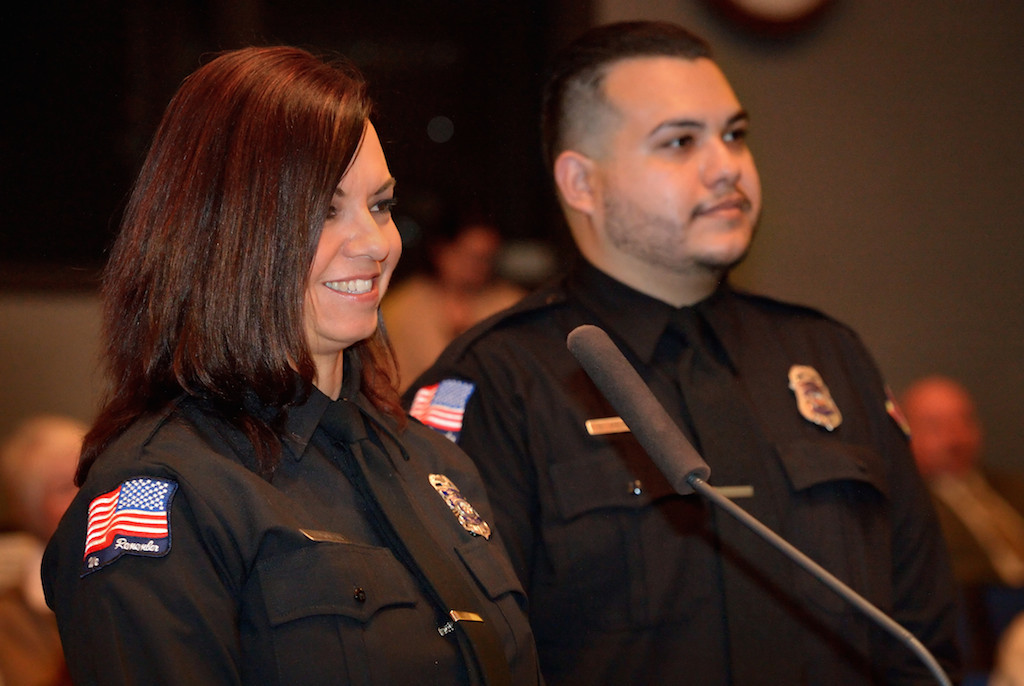
Lead Dispatcher Tracy Nolan, left, and Fire Dispatcher II Steven Perez of Metro Cities Fire Authority are honored before the Anaheim City Council on April 7 as the council issues a proclamation designating April 12-18, 2015 as National Public Safety Telecommunicators Week.
Photo by Steven Georges/Behind the Badge OC
They are the first first responders who never know what will be on the other end of a 911 call, but who have to make sense of each call quickly and then act efficiently.
Perez was one of two Metro Net fire dispatchers who, on April 7, accepted a proclamation from the Anaheim City Council to mark National Public Safety Telecommunicators Week.
Anaheim Police Department dispatchers also were honored.
“While we may answer thousands of calls each year, no call is ever the same,” Tracy Nolan, Lead Fire/EMS Dispatcher II at Metro Net, told the council.
“It is that aspect that makes a dispatcher a quick thinker, having to make split- second decisions to ensure that our citizens receive the highest quality of customer service while also ensuring the safety of our citizens and that of our field personnel,” Nolan said. “We are proud to be your dispatchers.”
Anaheim Mayor Tom Tait said: “Thank you for the service to our city. It’s a very tough job, and we appreciate it.”
Prior to the City Council meeting, Behind the Badge spent some time with Perez, also an EMS Dispatcher II at Metro Net, which handles fire calls for Anaheim and seven other cities that are part of the joint-powers authority.
Perez, 30, has been an EMS dispatcher for eight years and has answered emergency calls for Metro Net for five years.
During his 7 p.m. to 7 a.m. shift, he may answer up to 40 calls — or as few as five.
Every shift can be different.
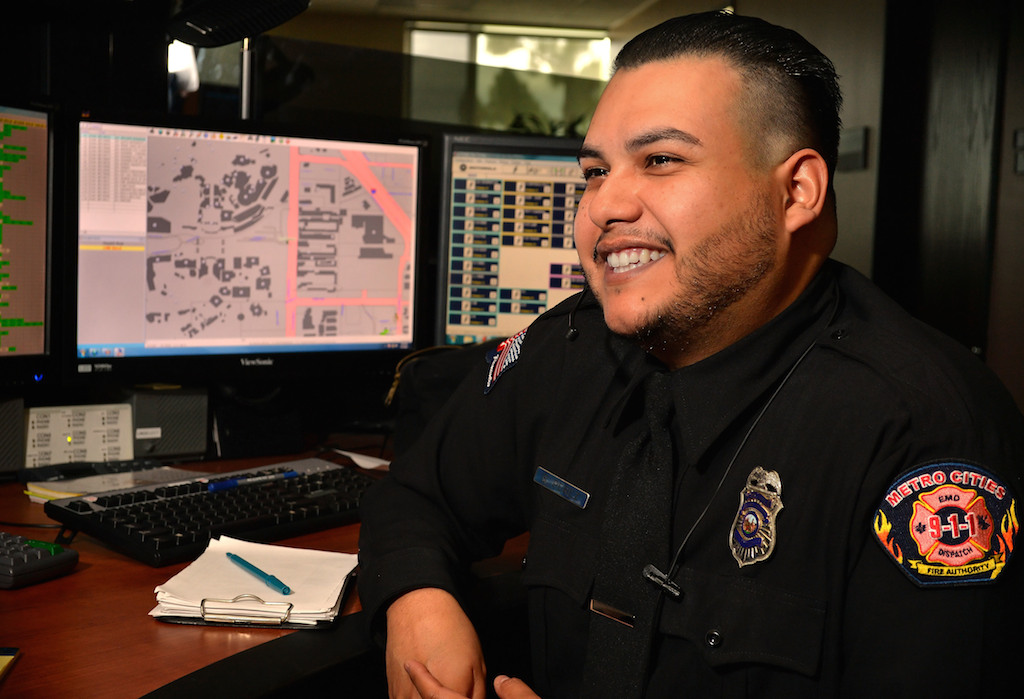
Steven Perez, Fire Dispatcher II for Metro Cities Fire Authority, talks about his experiences as a 911 fire dispatcher.
Photo by Steven Georges/Behind the Badge OC
Traffic collisions.
Heart attacks.
Drownings.
Perez talks to people during their worst possible moments — people who typically will only call 911 once during their lives.
Although he’s dealt with countless traumatic experiences, Perez makes sure he treats each caller with respect — as if every call is the most important one he’ll get.
“He’s a very good dispatcher,” says his boss, Gary Gionet, manager of Metro Net, whose official name is Metro Cities Fire Authority.
“He’s able to stay calm during the chaos, show empathy with each caller, and take control when necessary.”
People who aren’t cut out for dispatching usually are weeded out quickly, dispatchers say. It’s the type of profession, they say, that takes a certain type of individual. And the ones who are good at it usually stick around.
Perez has received three life-saving medals while at Metro Net, for talking callers through emergency first aid while paramedics rolled to the scenes.
From his console, he can see the status of every available fire department unit in each of the eight cities Metro Net handles, and all the calls coming in to the fire dispatch service.
Perez’ computer screen displays a sad litany of human misery:
A man is lying down in front of a liquor store in Huntington Beach.
The CHP is en route to a traffic accident on the 91 Freeway.
Someone in Orange is unconscious.
When Perez is on the phone, he keeps in mind one of the golden rules of dispatching:
Always give them a direction with a reason.
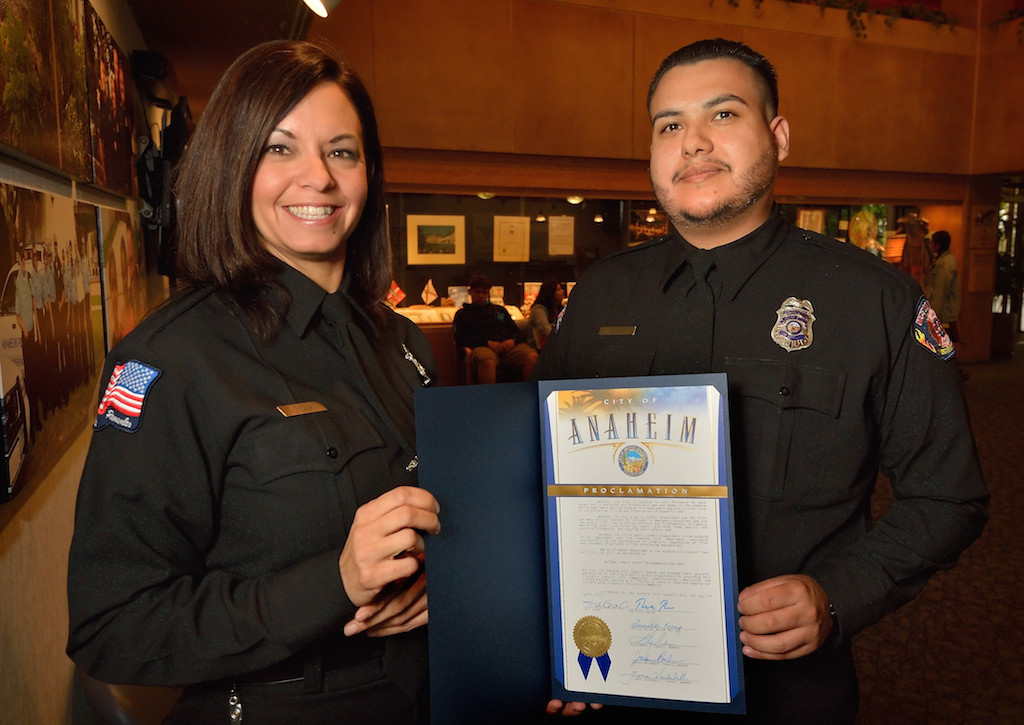
Lead Dispatcher Tracy Nolan, left, and Fire Dispatcher II Steven Perez of Metro Cities Fire Authority hold a proclamation by the Anaheim City Council designating April 12-18, 2015 National Public Safety Telecommunicators Week.
Photo by Steven Georges/Behind the Badge OC
“For example,” Perez said, “I’ll tell someone, ‘You need to calm down so we can help the patient,’ or, ‘You need to stop screaming so I can understand you.’”
When Perez is talking to callers, questions will flash on a screen for him to ask them based on the problem they’re having. He inputs the information into a computer as quickly as possible while another dispatcher simultaneously dispatches the closest first responders.
Though Perez, through his training and experience, knows many of the questions to ask, the computerized system is a valuable tool — especially for calls involving emergencies that are not as common as others, say, ones involving “machine entrapment.”
In addition to on-the-job training, CPR and EMD certification, dispatchers undergo continued education every month and recertification training every two years, Gionet said.
And every month, he said, a certain number of a dispatcher’s calls are randomly selected for review to make sure the dispatcher is performing to high standards.
Perez said he gets a lot of satisfaction helping people during their worst moments.
But in almost every case, he never hears how their story turns out.
“It’s like sitting down to watch a movie,” he said, “but never seeing the last 30 minutes of it.”
 Behind the Badge
Behind the Badge
